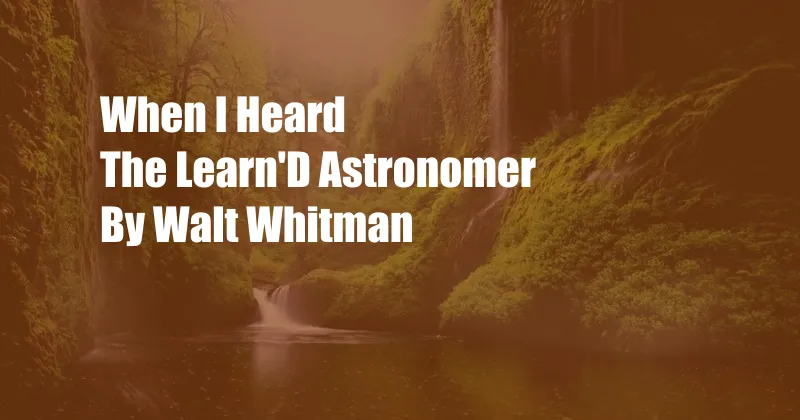
**When I Heard the Learn’d Astronomer**
Walt Whitman’s iconic poem, “When I Heard the Learn’d Astronomer,” is a profound exploration of the human soul’s yearning for transcendence and the conflicting nature of scientific knowledge and spiritual experience. The poem’s speaker, initially captivated by the astronomer’s intricate exposition of celestial bodies, gradually feels a sense of emptiness and dissatisfaction. This dissonance between the quantitative rationalism of science and the intuitive, emotive realm of the soul sets the stage for a journey of self-discovery.
The poem’s evocative imagery and lyrical language create a multi-sensory experience, drawing the reader into the speaker’s inner world. Through vivid descriptions of the astronomer’s lecture, the speaker’s wandering thoughts, and the transformative power of nature, Whitman invites us to delve into the complexities of human consciousness and the quest for meaning in the face of scientific and spiritual uncertainty.
**The Tension Between Reason and Emotion**
The tension between reason and emotion is a central theme in the poem. The astronomer, with his methodical calculations and precise observations, represents the analytical, rational mind. His scientific knowledge, however, fails to satisfy the speaker’s deep-seated longing for a more meaningful connection to the universe. This conflict between the intellect and the emotions highlights the limitations of scientific empiricism in capturing the full spectrum of human experience.
The speaker’s wandering thoughts, prompted by the astronomer’s lecture, reflect the vagrant nature of consciousness. He moves effortlessly between scientific wonder and existential contemplation, questioning the purpose of human existence and the elusive nature of truth. This stream of thought reveals the human mind’s inherent curiosity, its ability to transcend limitations, and its insatiable desire for understanding.
**The Transformative Power of Nature**
Nature plays a pivotal role in the poem, providing a sanctuary for the speaker’s troubled soul. When the astronomer’s lecture proves unsatisfying, the speaker seeks solace in the natural world. The open sky, the grass beneath his feet, and the scent of the breeze invigorate his senses and bring him closer to a sense of cosmic connection.
Through vivid descriptions of natural phenomena, such as the night sky and the waves on the shore, Whitman conveys the transformative power of nature. Nature becomes a source of solace and inspiration for the speaker, offering a sense of peace and renewal that scientific knowledge cannot provide. The natural world serves as a reminder of the interconnectedness of all things and the boundless mystery that resides in the universe.
**The Quest for Meaning**
At the heart of “When I Heard the Learn’d Astronomer” lies a quintessential human quest for meaning. The speaker’s journey through the poem reflects our shared desire to find purpose, belonging, and connection in a vast and often incomprehensible universe. The tension between science and spirituality, reason and emotion, and the transformative power of nature reflects the complexities of the human condition.
Whitman’s poem invites us to embrace the fullness of our humanity, recognizing the limitations of both rationalism and blind faith. Through the speaker’s journey, we learn that true understanding lies in the reconciliation of seemingly opposing forces, the integration of knowledge and intuition, and the cultivation of a profound connection to both the natural world and the enigmatic realms of the human soul.
**Tips and Expert Advice**
If you are drawn to the themes and imagery of “When I Heard the Learn’d Astronomer,” consider exploring these avenues for further engagement:
- Read other works by Walt Whitman, such as “Leaves of Grass” and “Song of Myself,” to gain a deeper understanding of his poetic vision and style.
- Participate in poetry discussions and workshops to share your insights and connect with other enthusiasts.
- Explore the works of philosophers and scientists who have grappled with the tension between science and spirituality, such as Immanuel Kant and Albert Einstein.
- Spend time in nature, observing the intricacies of the natural world and reflecting on your own place within it.
- Practice mindfulness and meditation to cultivate a deeper connection to your inner self and the universe.
By engaging in these activities, you can expand your understanding of the poem’s themes, enrich your appreciation for Whitman’s artistry, and deepen your own exploration of the human condition.
**Frequently Asked Questions**
- Who is the speaker in the poem? The speaker is an unnamed individual who represents the human soul’s quest for meaning and connection.
- What is the significance of the astronomer? The astronomer represents the rational, scientific mind that provides knowledge about the universe but cannot fully satisfy the human desire for spiritual understanding.
- What is the symbolism of the natural world? Nature represents the intuitive, emotional, and interconnected aspects of human consciousness, which provide a sense of solace and inspiration beyond scientific knowledge.
- What is the main theme of the poem? The main theme is the tension between reason and emotion, science and spirituality, and the human quest for meaning in the face of cosmic uncertainty.
- What is the poem’s significance? “When I Heard the Learn’d Astronomer” is a timeless meditation on the complexities of human consciousness and the enduring quest for purpose and connection.
**Conclusion**
Walt Whitman’s “When I Heard the Learn’d Astronomer” is a profound and evocative poem that continues to resonate with readers today. Through its exploration of the tension between science and spirituality, reason and emotion, and the transformative power of nature, the poem invites us to embrace the fullness of our humanity and to seek meaning in the vastness of the universe.
Do you find yourself drawn to the themes and imagery of this iconic poem?